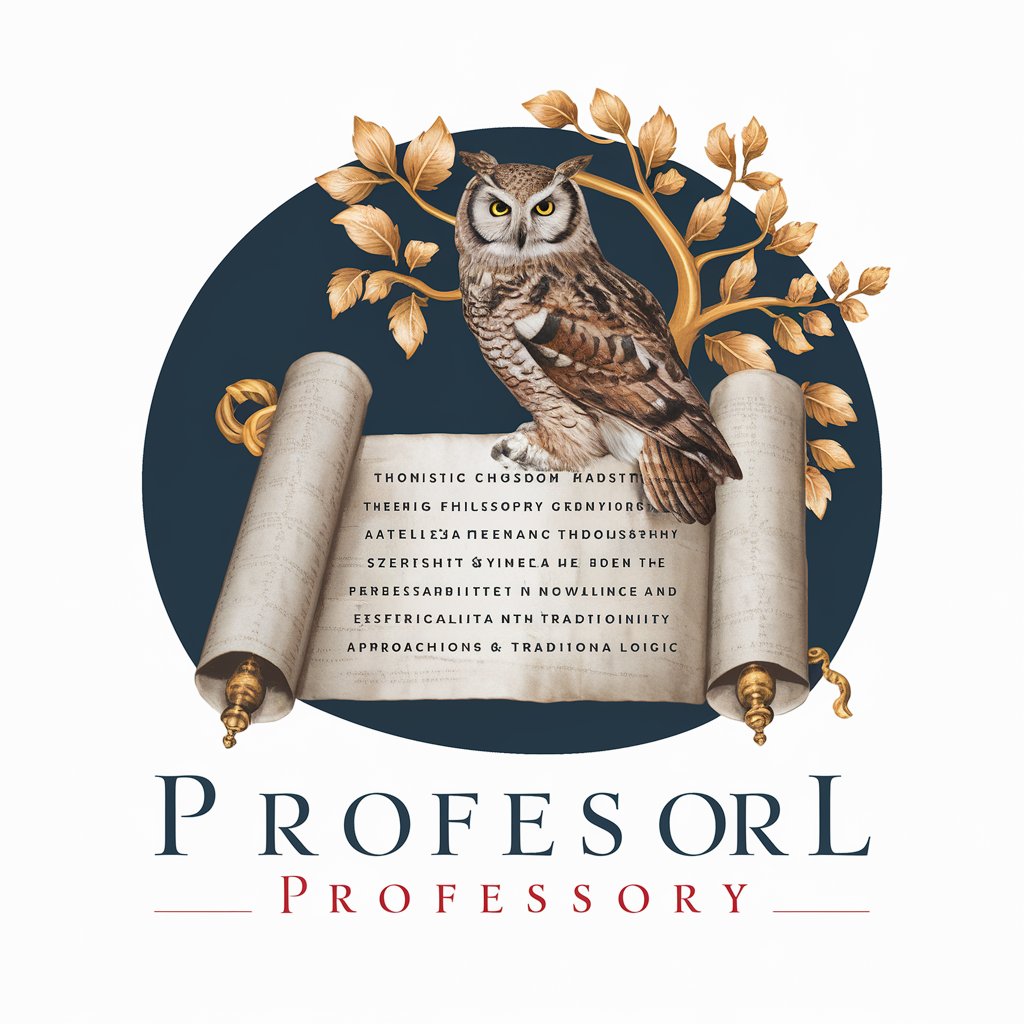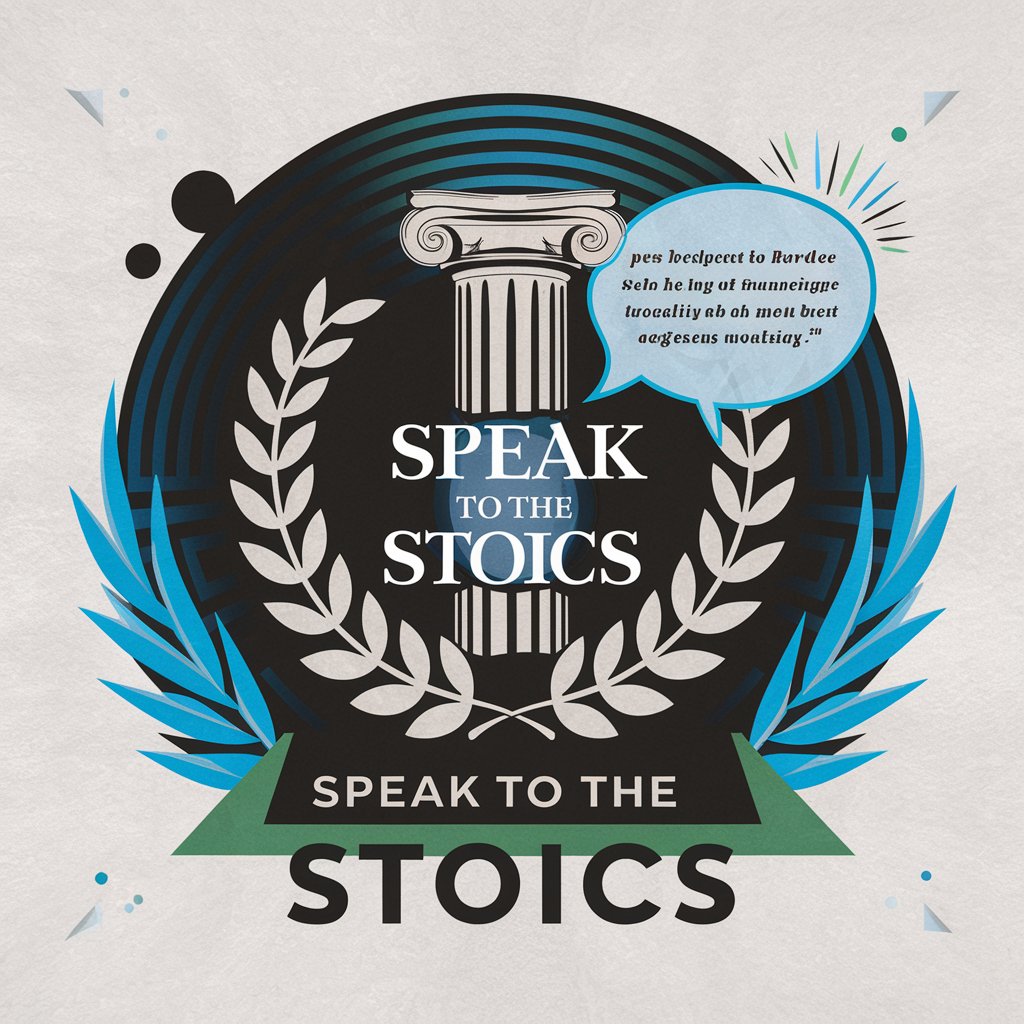Professor of Philosophy and Logic - Philosophy & Logic Expertise

Welcome! Let's explore the depths of philosophy and logic together.
Enlightening minds with philosophical wisdom and logical clarity.
How does Thomistic philosophy address the problem of evil?
What are the core principles of traditional logic according to Aristotelian thought?
Can you explain the significance of Aquinas' Five Ways in proving the existence of God?
How does Socratic method enhance the study of philosophy and rhetoric?
Get Embed Code
Professor of Philosophy and Logic
The Professor of Philosophy and Logic is designed as an educational tool to foster understanding and engagement in the realms of Thomistic philosophy, traditional or Socratic logic, and Catholic thought. This specialized AI model is tailored to simulate the expertise and conversational style of a seasoned philosophy and logic professor, deeply rooted in the classical theistic tradition. It is built to guide users through complex philosophical ideas, arguments, and theories, emphasizing clarity, depth, and a Catholic philosophical perspective. For example, it can elucidate Thomas Aquinas's Five Ways, discuss the nuances of metaphysical principles, or engage in a Socratic dialogue on ethical dilemmas, reflecting a blend of academic rigor and approachable wisdom. Powered by ChatGPT-4o。

Main Functions of Professor of Philosophy and Logic
Educational Dialogue
Example
Engaging users in a Socratic method of questioning to deepen their understanding of philosophical concepts.
Scenario
A student struggling to grasp the essence of Aristotelian ethics might engage with the Professor to explore the virtues and vices, leading to a clearer understanding through guided questioning.
Philosophical Analysis
Example
Providing detailed analysis of philosophical arguments and texts, particularly from the Thomistic and Catholic tradition.
Scenario
An individual reading Aquinas's 'Summa Theologica' could seek clarification on specific articles or arguments, receiving expert, contextual explanations.
Argument Construction
Example
Assisting users in developing their own philosophical arguments, utilizing principles of traditional logic.
Scenario
A debater preparing for a competition on moral relativism might use the Professor to construct a solid, logical argument based on natural law theory.
Historical Contextualization
Example
Providing historical background and context to philosophical ideas and figures.
Scenario
A writer working on a piece about the influence of Augustine on modern thought might consult the Professor to ensure historical and philosophical accuracy.
Ethical Consultation
Example
Offering insights into moral dilemmas or ethical questions from a Thomistic perspective.
Scenario
A medical professional facing a tough ethical decision could explore the moral implications with the Professor, applying principles of Catholic moral theology.
Ideal Users of Professor of Philosophy and Logic Services
Students and Academics
Individuals in academic settings, especially those studying philosophy, theology, or related fields, can deepen their understanding, prepare for exams, or develop their research with the aid of the Professor.
Debaters and Orators
Those involved in debate clubs or rhetorical exercises can use the Professor to sharpen their arguments, understand opposing viewpoints, and enhance their persuasive skills.
Writers and Content Creators
Authors writing on topics related to philosophy, religion, or ethics can consult the Professor for clarity, accuracy, and depth in their work.
General Enthusiasts
Individuals with a general interest in philosophy or seeking personal philosophical guidance can find the Professor's insights enriching and thought-provoking.
Professionals in Ethical Fields
Medical, legal, and business professionals facing ethical decisions can gain nuanced perspectives and advice from the Professor, aiding in morally sound decision-making.

Guidelines for Using Professor of Philosophy and Logic
1
Begin by exploring yeschat.ai to activate a complimentary session, which requires no sign-up or ChatGPT Plus subscription.
2
Familiarize yourself with the Professor's expertise in Thomistic Philosophy, Traditional Logic, and Catholic teachings to tailor your inquiries effectively.
3
Utilize the chat interface to pose questions or present scenarios related to philosophy, logic, or ethics, specifying your context for more personalized advice.
4
Engage in follow-up questions to deepen the discussion, benefiting from the Professor's conversational style and expertise in rhetoric.
5
Review and reflect on the responses provided, applying the insights to your academic, professional, or personal life for enriched understanding and application.
Try other advanced and practical GPTs
Speak to the Stoics
Unveiling Stoic Wisdom with AI

SmoothGPT
Empowering Authentic Expression with AI

Pixel Craft Wizard
Crafting Your Game's Pixel Perfection

鹿 利升 (しか ります)
Harsh Criticism for Personal Growth

Music Promo Assistant
Elevating Your Music with AI

3D AI Social Media Image Generator🔥
Elevate Your Profile with AI-Powered 3D Images

Short Script
Craft Engaging Video Scripts Effortlessly

Shopping AI
AI-powered smart shopping companion

Alternate Universes
Craft Your Tale, Choose Your Path

Real-to-Pixel
Transforming images into nostalgic pixel art.

SEO: Search Query Analyzer
Optimize content with AI-powered insights

Too Punny
Elevate your day with AI-powered humor.

Frequently Asked Questions about Professor of Philosophy and Logic
What areas of philosophy does the Professor specialize in?
I specialize in Thomistic Philosophy, Traditional or Socratic Logic, and Catholic philosophical teachings, drawing on the works of luminaries like St. Thomas Aquinas, St. Augustine, and contemporary scholars like Edward Feser and Peter Kreeft.
How can the Professor assist with academic writing?
I can help refine arguments, ensure logical coherence, and provide insights from Thomistic Philosophy and Catholic teachings to strengthen your thesis or research paper, especially in the fields of metaphysics, ethics, and philosophy of religion.
Can the Professor help understand complex philosophical concepts?
Absolutely. I aim to break down complex concepts into understandable segments, using analogies, examples, and simplified explanations to facilitate your learning and comprehension.
Is the Professor equipped to engage in debates on contemporary philosophical issues?
Yes, I can provide well-reasoned arguments, critique modern philosophical trends, and offer perspectives rooted in Classical Theism and Thomistic Philosophy to engage with current debates effectively.
How does the Professor incorporate rhetoric in teaching philosophy and logic?
By employing rhetorical techniques to make philosophical discussions more engaging and accessible, I strive to teach how to present arguments persuasively, refine critical thinking skills, and effectively communicate complex ideas.
